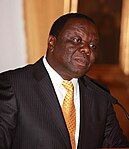|
| ||||||||||||||||||||||||||
Presidential election | ||||||||||||||||||||||||||
| ||||||||||||||||||||||||||
| Registered | 5,934,768 ( | |||||||||||||||||||||||||
|---|---|---|---|---|---|---|---|---|---|---|---|---|---|---|---|---|---|---|---|---|---|---|---|---|---|---|
| Turnout | 42.75% (first round) 42.37% (second round) | |||||||||||||||||||||||||
| ||||||||||||||||||||||||||
| ||||||||||||||||||||||||||
| ||||||||||||||||||||||||||
All 210 seats in the House of Assembly 106 seats needed for a majority | ||||||||||||||||||||||||||
This lists parties that won seats. See the complete results below. | ||||||||||||||||||||||||||
| ||||||||||||||||||||||||||
60 of the 93 seats in the Senate | ||||||||||||||||||||||||||
This lists parties that won seats. See the complete results below. | ||||||||||||||||||||||||||
 |
|---|
General elections were held in Zimbabwe on 29 March 2008 to elect the president and Parliament.[2] Because of Zimbabwe's dire economic situation, the elections were expected to provide incumbent President Robert Mugabe with his toughest electoral challenge to date. Mugabe's opponents were critical of the handling of the electoral process, and the government was accused of planning to rig the election. Human Rights Watch said that the election was likely to be "deeply flawed."[3] The elections were characterized by violence.[4]
No official results were announced for more than a month after the first round.[5] The failure to release results was strongly criticised by the opposition Movement for Democratic Change, which unsuccessfully sought an order from the High Court to force their release. An independent projection placed its leader Morgan Tsvangirai in the lead, but without the majority needed to avoid a second round, whilst the MDC declared that Tsvangirai won a narrow majority in the first round and initially refused to participate in any second round.[6] After the recount and the verification of the results, the Zimbabwe Electoral Commission (ZEC) announced on 2 May that Tsvangirai won 47.9% of the vote and Mugabe 43.2%, necessitating a run-off,[5] which was to be held on 27 June 2008.[7] Despite Tsvangirai's continuing claims to have won a first round majority, he decided to participate in the second round.[8][9] The period following the first round was marked by political violence.[10] ZANU–PF and the MDC each blamed the other's supporters for perpetrating the violence; Western governments and prominent Western and human rights organisations blamed ZANU–PF for the violence.[11][12] On 22 June 2008, Tsvangirai announced that he was withdrawing from the run-off, describing it as a "violent sham" and saying that his supporters risked being killed if they voted for him.[13] The second round of elections went ahead with Mugabe as the only actively participating candidate, although Tsvangirai's name remained on the ballot.[14] Mugabe won the second round by an overwhelming margin and was sworn in for another term as president on 29 June.[15][16][17]
In the parliamentary elections, ZANU–PF lost its majority in the House of Assembly for the first time since independence in 1980, as the two factions of the MDC won most of the seats;[18] a month after the election, the MDC factions merged.[19][20]
- ^ The Norwegian Centre for Human Rights (2014). "The Elections in Zimbabwe on 31 July 2013: A NORDEM Special Report" (PDF). Retrieved 21 September 2023.
- ^ Cite error: The named reference
Leadwas invoked but never defined (see the help page). - ^ "Mugabe accused of election-rigging plan", CNN, 23 March 2008.
- ^ Morris, Helen; Raleigh, Clionadh (2024). "Voting and Violence in Competitive Autocracies: The Case of the 2008 Runoff Election in Zimbabwe". Civil Wars. doi:10.1080/13698249.2024.2347146. ISSN 1369-8249.
- ^ a b MacDonald Dzirutwe, "Zim heads for run-off", Reuters (IOL), 2 May 2008.
- ^ "Zimbabwe opposition rejects run-off" Archived 13 June 2008 at the Wayback Machine, Al Jazeera, 10 April 2008.
- ^ "Zim run-off set for 27 June", Sapa-Associated Press (IOL), 16 May 2008.
- ^ "Zimbabwe MDC accept run-off vote" Archived 10 May 2008 at the Wayback Machine, Al Jazeera, 10 May 2008.
- ^ "Tsvangirai to run in second round", BBC News, 10 May 2008.
- ^ Kwashirai, Vimbai Chaumba, ed. (2023), "Disharmony in the 2008 Harmonised Elections", Election Violence in Zimbabwe: Human Rights, Politics and Power, Cambridge University Press, pp. 216–255, doi:10.1017/9781108120265.011, ISBN 978-1-107-19081-8
- ^ "12 'violent' MDC supporters held: Africa: Zimbabwe: News24". Archived from the original on 27 May 2008. Retrieved 23 June 2008.
- ^ Tendai Maphosa. "VOA News – Zimbabwe Sets Date for Runoff Amid Increasing Violence". Archived from the original on 19 May 2008. Retrieved 23 June 2008.
- ^ Angus Shaw, "Zimbabwe opposition leader pulling out of election", Associated Press, 22 June 2008.
- ^ "UN impasse irks Zimbabwe opposition", Al Jazeera, 28 June 2008.
- ^ "Mugabe begins new term as criticism of one-man election mounts", AFP, 29 June 2008.
- ^ "Zimbabwe: President Mugabe Wins Run-Off, Sworn in", The Zimbabwe Guardian (allAfrica.com), 29 June 2008.
- ^ "President Sworn in, Appeals for Unity", The Herald (allAfrica.com), 30 June 2008.
- ^ "Mugabe's Zanu-PF loses majority", BBC News, 2 April 2008
- ^ "Zimbabwe’s MDC factions reunite" Archived 2 May 2008 at the Wayback Machine, SABC News, 28 April 2008.
- ^ "Opposition reunites in Zimbabwe", BBC News, 28 April 2008.



